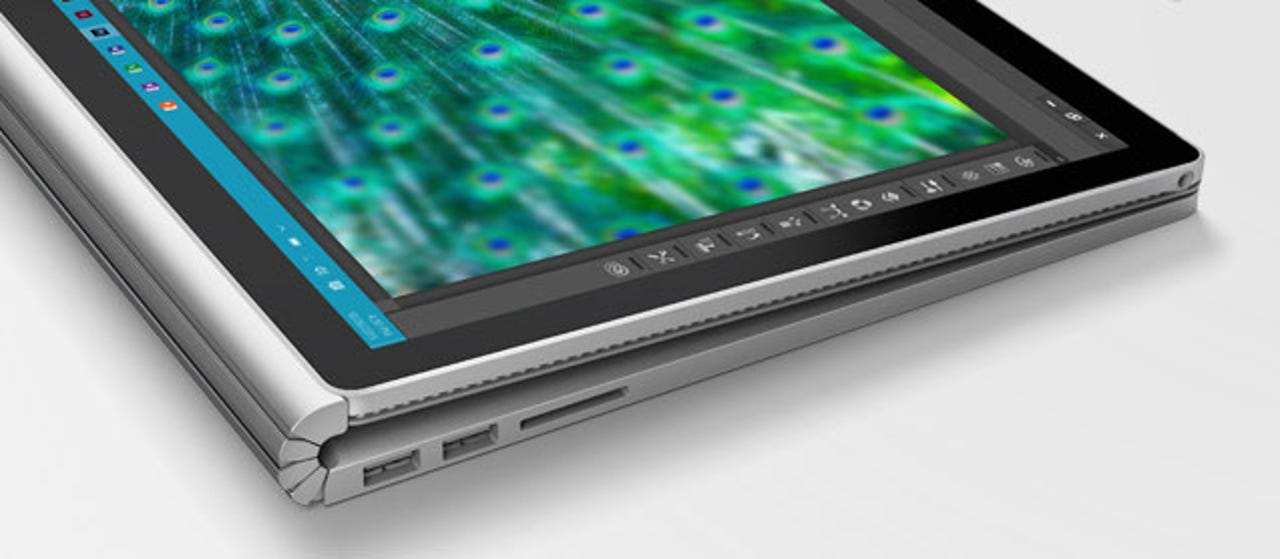2-in-1 decision challenge: Surface Book, Surface 4 Pro, XPS 12 or iPad Pro?


Darn you, Microsoft.
Last month, I decided to finally rid myself of carrying both a laptop and tablet and was seriously considering an iPad Pro purchase in November. Then you had to debut not just the improved Surface Pro 4 but the innovative Surface Book. Even worse: Dell is challenging with its new XPS 12. Argh!
It's actually a great problem to have. And it's one that I suspect others will grapple with in the coming months as the 2-in-1 computing category becomes viable for a wider audience.
My own decision may actually be more difficult though, for a few reasons that don't apply to others.
First, my computing needs are actually relatively meager and I try to keep up with all of the major platforms. So I actually rotate through using a Chromebook Pixel, MacBook 12 and HP laptop running Windows 10.
As a full time writer, my most used app is really a browser. I can write directly into a content management system through the web. Other daily activities include email (although I wish I could rid myself of that one!), social networking, music and video consumption, light gameplay, general web browsing and online reading. I have no need of a digital pen and don't run many full desktop apps.
iPad Pro(s) and cons
That's why the iPad Pro is even in the mix for me but may not be for many others.
In fact, over the past few weeks, I've used an iPad Air and wireless keyboard to write several of my recent ZDNet posts. It's not ideal on a small 9.7-inch display but the 12.9-inch screen of the iPad Pro resolves that issue. And I'd get the new iOS 9 Split Screen feature to help with writing and researching on the same screen.
I've noticed that without trackpad or mouse support, iOS 9 is still not ideal. When writing on the web, I have to reach up and tap the screen nearly a dozen times just to fill in the fields for one post here at ZDNet, for example. You can mouse around using the iPad's software keyboard with two fingers but that's even more reaching up.
I also tinker around with some programming languages after recently taking a Computer Science and Java course at my local community college just for fun. Yes, I have strange hobbies but the point is, an iPad Pro isn't suited for programming apps.
Then there's my participating and editing of several audio and video podcasts on a weekly basis. Skype is my main tool for that so any device should work. Editing could be a challenge since I use Audacity these days but Garage Band for iOS ought to do the trick.
My occasional development efforts and podcasting are really better suited to desktop platform. And those new offerings from Microsoft and Dell are compelling to be the "one" device for both laptop and tablet use.
Surface Book: More laptop than tablet
I've been most impressed by the Microsoft Surface Book. And the $1,499 starting price really isn't an issue (although it will tap out my gadget budget for the next few months). Heck, I spent $1,449 for a Chromebook Pixel with LTE back in 2013 and never regretted it.
I'm yet not sold that the Surface Book is best for me though.
I do appreciate the hardware keyboard base and generous trackpad; that's something you won't find for the iPad Pro, save perhaps from a third-party. And clearly, there's plenty of horsepower under the hood for my computing requirements.
My concern is the removable screen, which is really a tablet but Microsoft is calling a "clipboard."
I think it's doing so for a good reason: The company expects Surface Book owners to use the device in laptop mode around 80 percent of the time. As a result, the clipboard is for occasional use as evidenced by the battery life: About three hours since most of the device's battery capacity is in the base.
Again, I'm probably not typical of most computing users these days but I generally split my time between a laptop and a tablet: Around six hours each, per day.
Surface Pro 4: More tablet than laptop
Featured
Having used every Surface product to date, I already know what to expect from the new Surface Pro 4. For tablet use, I generally like the Surface line. And while the Microsoft Type Covers have steadily improved, they're not ideal for me unless I'm at my desk.
Even worse has been my experience with the trackpads; again, they've improved but they're a bit small. I could buy a mouse to solve that problem, of course, so I'm not counting the Surface Pro 4 out, especially since the new Type Cover trackpad is 40 percent larger than before.
On the plus side, the $899 base Surface Pro 4, or even the first step up from the base, would cost me much less than a Surface Book. And obviously, all the advantages of a full desktop platform apply just as much to the Surface Pro 4 as they do to the Surface Book.
The Surface Pro 4 would also work with my 50-50 split of laptop and tablet use. I just wish there was a keyboard option that provided a better typing / trackpad experience like the Surface Book for the Surface Pro 4.
Maybe there is.
Dell XPS 12: Best of both worlds?
It looks to me like Dell is offering some middle ground here with the XPS 12.
The 12.5-inch tablet houses all of the battery capacity and computing components while there's an actual hardware keyboard base. I think of it as possibly offering the best of both worlds between the two Microsoft products.
While Dell limits the processor choice to one and only one -- a Core m5 -- I suspect Windows 10 will run just fine on it. It won't match Surface Book levels of performance but my needs don't require that. And it's a step up from the $899 Surface Pro 4, which uses an Intel Core m3.
Battery life is rated at around 12 hours, so I'd be covered there. While I haven't tried the keyboard or trackpad, they both look more serviceable than what a Type Cover provides. For all of my writing efforts, that's key.
So what are the downsides?
The non-adjustable screen angle when using the keyboard base may be, but I won't know until I try it, of course.
I'm also spoiled by the displays on my Chromebook, Mac and tablets so the base 1080p screen would be a step down. That means I'd have to jump to the $1,299 XPS 12 model for a 4K display. I suspect that would mean a battery life hit.
Apps: To be or not to be (on Windows)
Lastly, I'd be giving up many of the mobile apps that I use today on my iPad if I chose any of the Windows options.
It may not be too bad though. I've started to make a list of all of the apps installed on my iPad so that I can see which are -- and aren't -- available on Windows 10.
Some of the iOS ones that don't have a Windows counterpart are media apps but are still available through the browser, so I can make do.
I do rely heavily on Google apps and services and you won't find them on Windows unless you want to live in the browser again. So that's a bit disappointing but hey: You can't have it all.
For the next few weeks then, I'll be continuing my personal app comparison list and kicking around the pros and cons of my 2-in-1 choices. Ideally, I need a device that meets my computing needs, lets me write effectively and still provides a solid lean-back tablet experience for hours each day.
All of the four choices I've outlined can fit those needs; now I just need to decide which fits them best. And kudos to Microsoft, not to mention Dell here. Both companies introduced products that have me excited about Windows again for the first time in years.